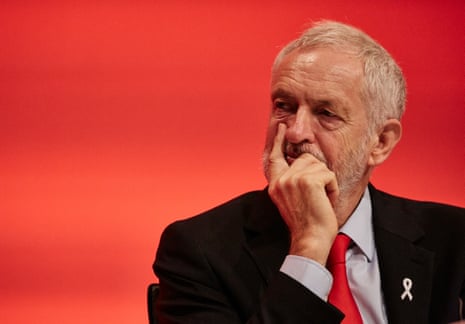Jeremy Corbyn has lost his majority on Labour’s national executive committee after a fierce debate at the party conference, where there were accusations of attempts to rig the balance of the party executive.
Conference voted on Tuesday to adopt controversial rule changes to let Labour leaders in Scotland and Wales nominate one person each to sit on the NEC. The Scottish Labour leader, Kezia Dugdale, will now join the committee as a full member and the Welsh first minister, Carwyn Jones, will also choose a representative.
NEC members wanted better Welsh and Scottish representation at the top of the party, but the extra NEC seats are a key win for the anti-Corbyn faction in the party.
Dugdale and Jones have both been critical of Corbyn. Giving them each the right to sit on, or nominate someone to sit on, the NEC meant Corbyn’s allies lost their majority support on the committee, despite six leftwing candidates being elected to the executive this summer.
At the conference debate, some delegates had earlier called the process a stitch-up and gerrymandering, but the motion was comfortably carried by a vote later on Tuesday.
Dugdale called the reforms “the biggest changes we’ve seen to how the Scottish Labour party is run in a generation”.
She said in a statement she would sit on the the NEC herself given the “vital importance” of the role. “I will be a loud and passionate voice for Scotland’s interests within our UK-wide Labour family. This is a key moment in the history of our party, and our movement.”
The party leadership had tried to insist that the Scottish and Welsh NEC representatives be chosen by members, but it was overruled.
The national executive committee is Labour’s ruling body, which makes decisions over the party rule book and helps set the direction of policy-making.
It has crucial power over how leaders are elected, including the number of MPs needed by each candidate to get on the ballot and who is allowed to vote.
On Tuesday morning, despite some protests from party members and union representatives, delegates voted overwhelmingly to allow NEC rule changes to be put through as one package, alongside measures popular with Corbyn supporters, such as allowing a sitting leader to be automatically on a leadership election ballot.
At a furious session of morning conference, the general secretary of the TSSA union, Manuel Cortes, asked for a “reference back” so delegates could vote on all 15 proposed rule changes separately.
Despite loud protests from some delegates, the chair, Paddy Lillis, said there was a clear majority against voting for the rule changes separately.
During the debate, the Momentum activist Max Shanly, a Young Labour delegate, tore into NEC members on stage in the conference hall, saying the party was “attempting to rig the discussion”.
Shanly accused moderate MPs of trying to curb Corbyn’s power and undermine the leadership election result. The change would “gerrymander the NEC”, he said, deriding MPs as “not accountable to this movement”.
Leigh Drennan, the chair of North-west Young Labour, also gave an angry speech, saying the rule change was “essentially a stitch-up of the NEC” to loud applause and cheers from supporters in the balcony.
“It disenfranchises members because it is the leaders who appoint themselves,” he said. “All members should be able to put themselves forward to represent their nation. It’s common sense.”
David Flat, another constituency Labour party delegate, said he was “appalled at the lack of democracy and gerrymandering that’s going on in our party”, which he said was being “bamboozled” into changing the rules.
The Scottish MSP Jackie Baillie said she was appalled at the attempts to block the change because of party factionalism. “If we put internal politics ahead of the interests of the people of Scotland and Wales, we will pay a price for it,” she said.
On Monday, Corbyn said he was happy with Scottish and Welsh representation and that the dispute had only been over the process of selecting those members.
Jones, who will join a meeting of the NEC on Tuesday night via telephone, said the reforms were “a significant step forward – not just for Welsh Labour – but the whole Labour movement in the UK”.
The new power balance on the NEC will make it less likely that the leadership will be able to institute sweeping party reforms, including rumoured moves to permit open selections after boundary changes. MPs fear that could lead to Momentum-backed candidates standing against sitting MPs in a battle for the new constituencies.
The leftwing Scottish Labour group, the Campaign for Socialism, condemned the decision on Tuesday and said a new Scottish representative should be elected by members. Spokesman Vince Mills said: “Having a leader place someone on the NEC is an exercise in patronage, not democracy.”










Comments (…)
Sign in or create your Guardian account to join the discussion